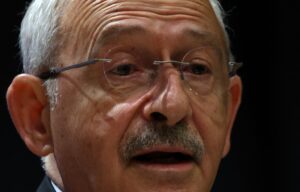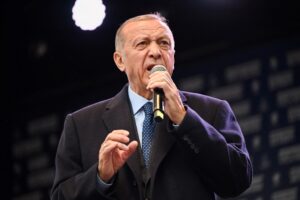Abdullah Bozkurt/Stockholm
If it hadn’t been for an inept election campaign and failure to prevent election fraud, Turkey’s rudderless opposition could have won the presidential election on May 14 against the backdrop of a worsening economic outlook and the colossal failure of the government’s response to devastating earthquakes in February.
The opposition had a good chance of pulling a major electoral upset and ousting President Recep Tayyip Erdogan from power even if the election was not contested on fair grounds and the Turkish president is not committed to clean, open and transparent elections whatsoever.
Now it will be an uphill battle for the opposition to win the election runoff, and the odds certainly favor the incumbent president, who holds all the cards to bend the rules of the game and even to change them arbitrarily and abruptly when it suits him.
If the opposition loses the runoff on Sunday, Erdogan and his Islamist cronies and their allies in the far-right and neo-nationalist bloc will further tighten their grip on the levers of power in Turkey. They will go after each and every opposition and dissident bloc, dismantle the remaining pockets of resistance and crush all that remains as a glimmer of hope for democracy in Turkey.
Half the population was branded as traitors and terrorists by the ruling Justice and Development Party (AKP) during the election campaign and was accused of betraying the homeland for wanting to go with democracy-oriented, pro-Western values. The track record of the Erdogan government in the last decade is a harbinger of what to expect in the future. Turkey’s far-right Interior Minister Süleyman Soylu also made it abundantly clear that those who seek to align Turkey with transatlantic alliance partners in NATO would be cleansed for once and for all in the post-election era.

Remember that some 2 million people linked to the government-critical Gülen movement have been investigated and charged with terrorism in the last decade even though none of them have anything to do with terrorism or any violence whatsoever. Add to that the dissident Kurdish and leftist groups that faced the wrath of the Erdogan government on similar accusations, and the number is even more staggering. This will only escalate with an Erdogan win.
Furthermore, an opposition loss would create a strong feeling of disillusionment with the democratic electoral process among voters that would resonate for years to come. It would be tragic if Turks’ enthusiasm for democracy were to turn into unprecedented and widespread apathy. The unity among opposition political parties would wither away as Erdogan and his allies would seek to engineer a new political dynamic in which no future opposition would be strong enough to mount another challenge to their rule.
There have already been signs of internal squabbling, a blame game that has gone on among the opposition parties since the elections on May 14. The factionalism within the opposition was exacerbated further by proxies of the Erdogan government who posed as opponents when in fact they were secretly working with Erdogan to undermine the opposition. Erdogan’s corrupt regime is quite savvy when it comes to buying off opposition politicians with cash, favors, position and influence in the government.
Coupled with that, the opposition already suffers from a lack of strong and charismatic leadership, which is a turn-off for many Turkish voters. The opposition’s joint candidate Kemal Kılıçdaroğlu, a flip-flopping politician, ran a unifying campaign before May 14 in sharp contrast to Erdogan’s polarizing rhetoric and suddenly transformed himself into a hawkish, migrant-bashing figure, a sort of bad clone of Erdogan himself. This added more confusion to who Kılıçdaroğlu really is and what he wants to accomplish for Turkey.
The opposition appears to have already thrown in the towel over the last two weeks, and many opposition leaders were noticeably absent from the campaign trail, confining their speeches to town halls in Istanbul and Ankara, posting comments on social media and failing to effectively communicate with voters by campaigning in the field.

There have been indications that some in the opposition are already willing to negotiate with Erdogan in the post-election era in exchange for acceptance of the rigged election results and gift Erdogan with the legitimacy he needs in Turkey and abroad. Some have approached the government seeking to cut deals to prevent a post-election crackdown and position themselves to get a share from state coffers and post-election spoils.
This is, of course, an easy way out for the opposition to save face and cover up huge shortcomings with the handling of the electoral process. Tens of thousands of polling stations were not manned by the six-party opposition bloc on May 14, allowing Erdogan’s people to commit fraud with minimal hindrance. This also shows the opposition’s grassroots establishment is not that strong as opposed to what it was preaching before the election.
We know that Erdogan stole the election on May 14 by disrupting voting when he appeared to be headed for defeat. The reporting from polling stations mysteriously was at a standstill for three hours with no change in the numbers. But we don’t know precisely how he rigged the election because the opposition was simply not present on the ground to ensure the fair counting and tallying of ballots at polling stations.

For the two weeks since the first round, the opposition has never bothered to clear the air with its supporters by adequately addressing the systematic fraud and irregularities and never effectively rebutted the government’s claims of free and fair elections. Strangely Erdogan did not contest the results, either, even though officially he was just 0.5 percent shy of clinching victory. He was quick to concede to the need for a runoff, presumably to claim legitimacy in the electoral process and respond to allegations of fraud. In fact appearing on CNN international after the first round, Erdogan cited his acceptance of 49.5 percent support as evidence that he is not a dictator.
The opposition played into Erdogan’s hands in the 2018 elections by doing very little to publicize the systematic fraud back then. Now they are doing the same thing even though the opposition leader repeatedly promised to ensure the fair counting of ballots and prevent any irregularities. What is even more troubling this time around is that the Supreme Election Board (YSK) did not disclose the raw data from every polling station. Moreover, for some reason, the previous data on the presidential election in 2018 also vanished from the YSK’s website, reportedly to prevent analysts from comparing data sets and identify irregularities.
It would take a miracle to see an opposition victory in Sunday’s runoff that will surely be marred by fraud, falsification and intimidation as well. If that happens, the credit goes to not the opposition’s lackluster performance but rather to the hard realities of bread and butter politics that Turks have started to feel more and more in their everyday lives.
If not, we know the reasons for the failure. Salvaging this would not be easy for the opposition. I suppose in the end Erdogan’s real enemy is himself. The regime will implode from within one way or another. Most Turks will come to the point of blaming Erdogan for soaring unemployment and inflation, economic and financial hardship and declining public services in social security, healthcare and other areas.












